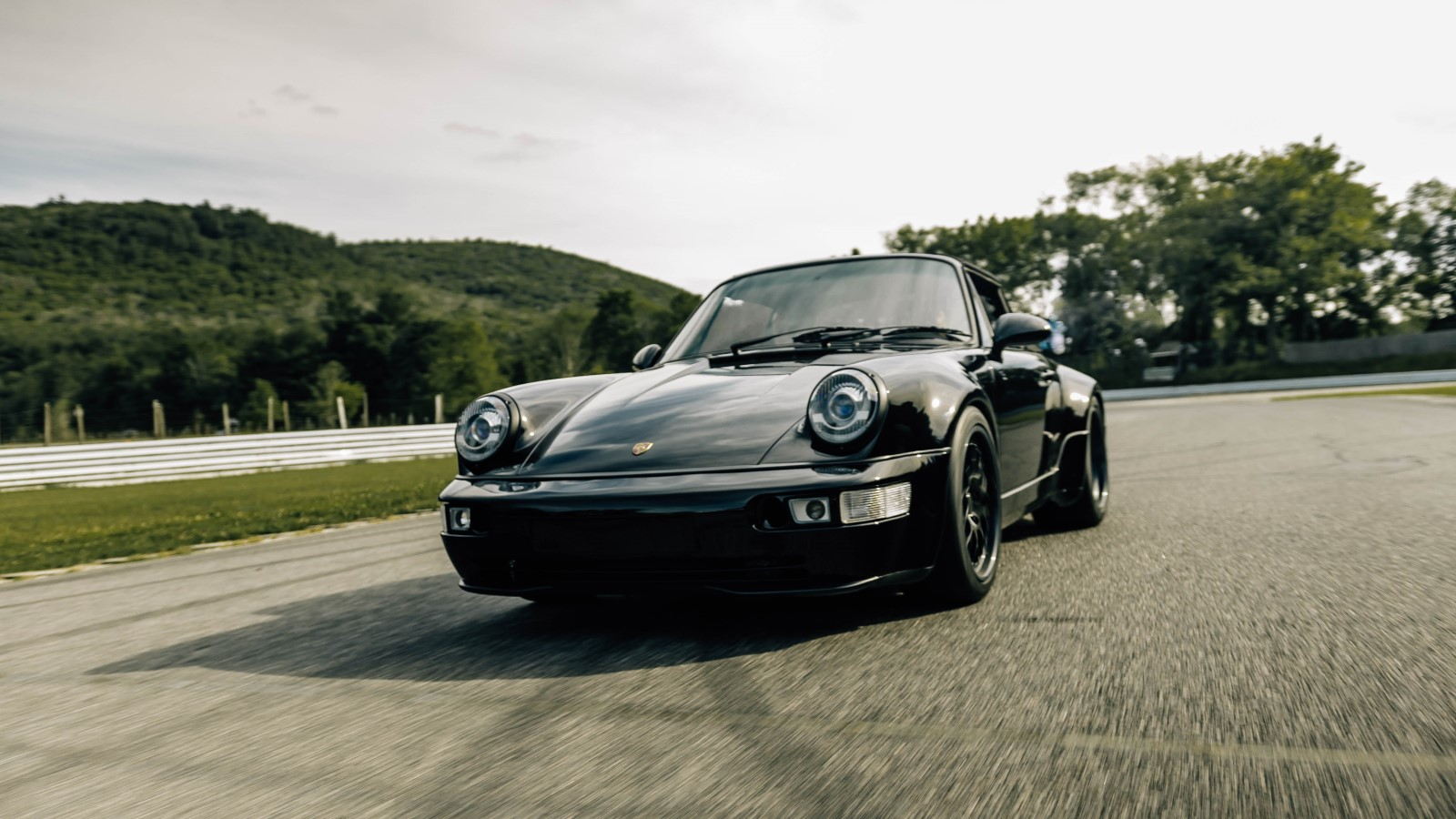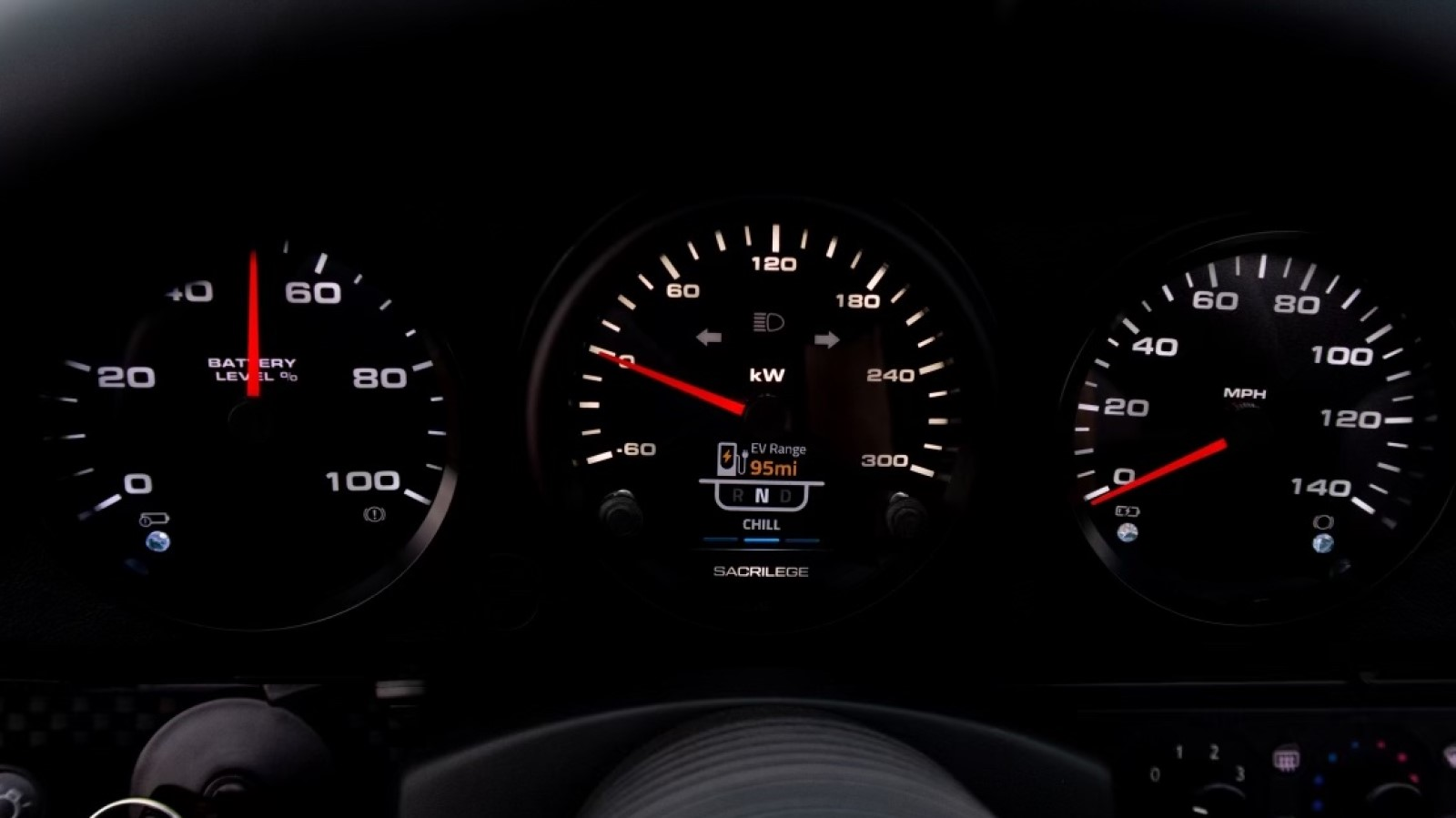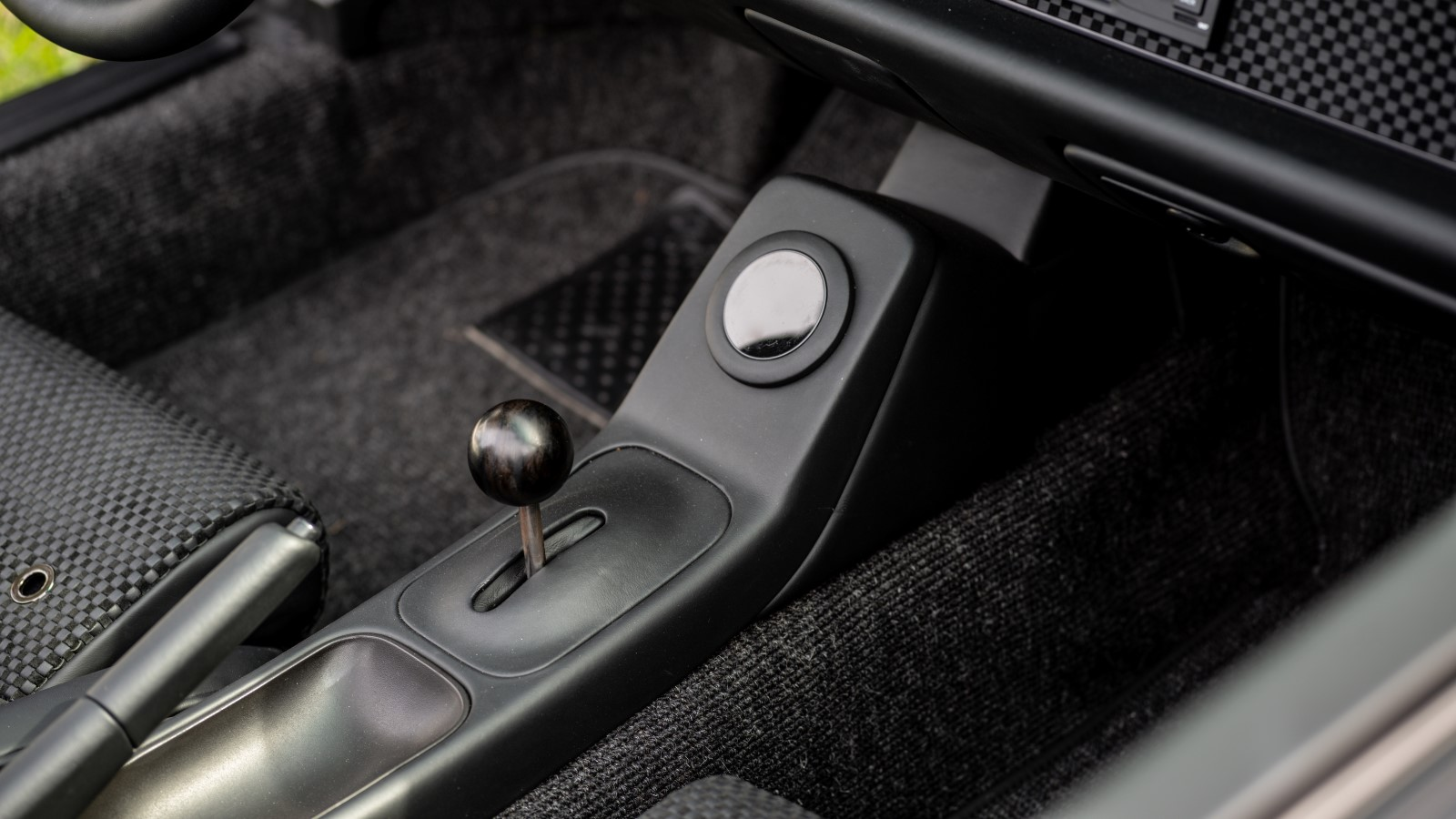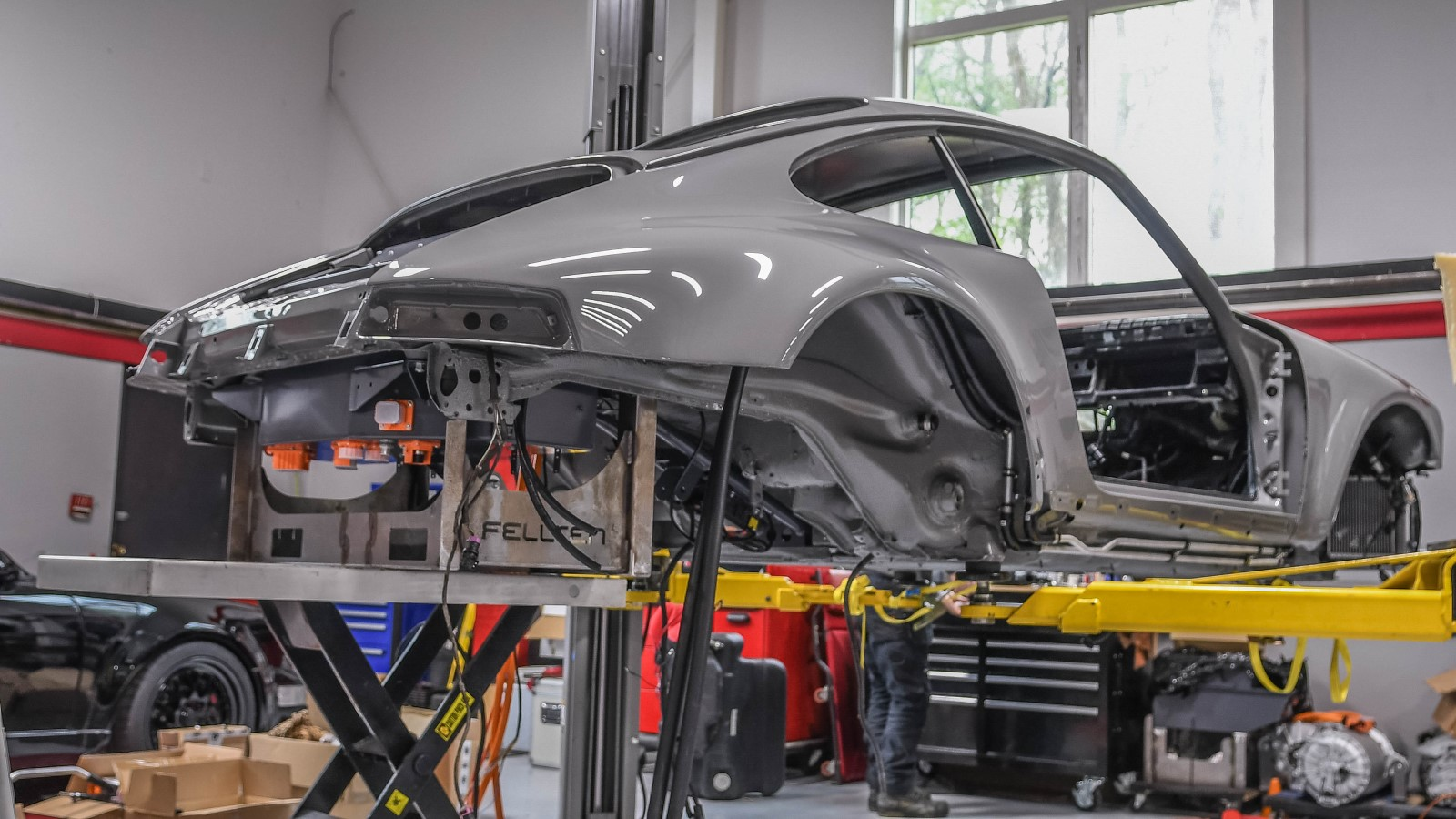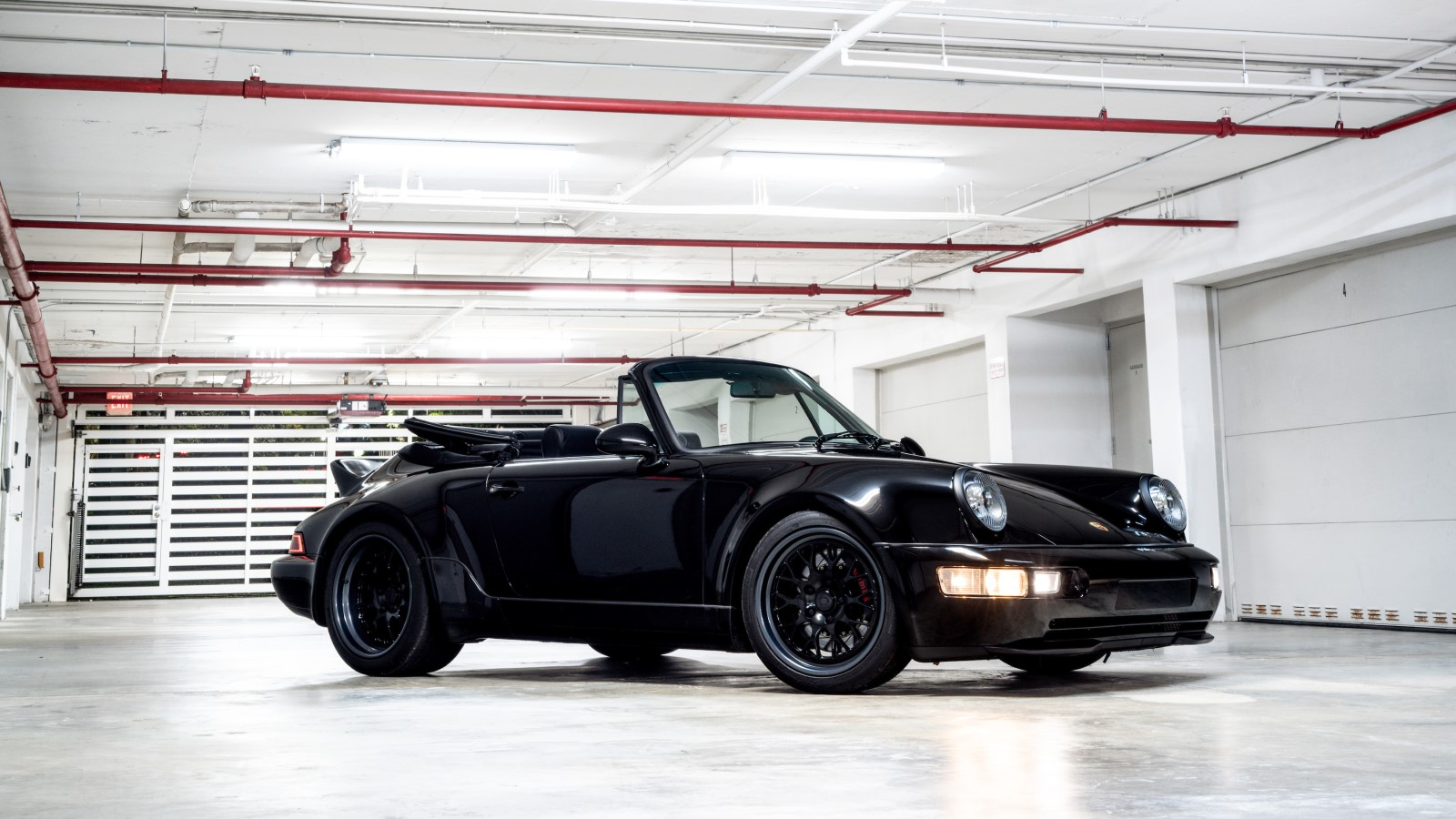The Blackbird Roadster Proves Electrifying Vintage Porsches Is Anything But Sacrilegious
The Sacrilege Motors Blackbird Roadster takes a classic Porsche 911 and packs it full of Tesla tech to create an EV you might actually want.
Blame the pandemic. Phil Wagenheim, the highly energized New York investment bro who is CEO and one of two partners at Connecticut's Sacrilege Motors, does. You see Wagenheim, who made bank during the early days of SPACs (Special-Purpose Acquisition Companies), had been hanging out with his kids at home a lot during the Covid lockdown. As in, a lot a lot.
A lifelong Porsche fan, he wanted to go for a drive to clear his head. Check that, he needed to go for a drive. As he approached his beloved 993 Turbo one day, however, Wagenheim noticed it was leaking oil, which made him mad. He called his longtime pal and soon-to-be business partner Bobby Singh, a respected Porsche mechanic, racer, race engineer and former Boeing 747 wrench. In a moment of pissed-off pique, Wagenheim told Singh: "Bobby, my car is leaking oil and it's smoking out the right tailpipe. Let's just convert this thing into an EV."
Singh founded factory-approved Porsche collision center Manhattan Motorsports and now runs a high-end Porsche shop in a former Skip Barber facility near Lime Rock, CT. Now, his resume also lists his new role as Sacrilege's president and chief engineer, but securing him at the company wasn't a certainty.

"Phil, you can't do that. You're an asshole," Wagenheim remembers Singh saying. "I go again, 'I'm an asshole, sure, but what's that got to do with the fact that I can't drive my car?'" Dubious at first, Singh tried to dissuade his well-heeled, schemin' and dreamin' customer. "He goes, 'Phil, it's the last year of the air-cooled cars. You can't do that. But you've always wanted an '89 Turbo Cab. Why don't you get an M491 [Turbo-look] car and we'll do it to that?'"
Wagenheim feared Singh still wasn't taking him seriously. "But then, I called him up 15 minutes later. 'Okay, Bobby, the car will be at your shop on Wednesday'. And he's like, 'What car? What are you talking about?' I'm like, 'The 1992 M491. Let's convert it to EV'."
Already Sacrilegious
So, says Wagenheim, "the journey" began. Alongside Singh, the pair launched Sacrilege Motors, which is now ready to take your order for a fully electric 911 that's been built using donor G-body (1973-1989) or 964 (1989-1994) Porsches.
"Earlier cars aren't strong enough for all the torque of the electric motors and later ones are too big and computerized," says Wagenheim who, while happy to call himself an early adopter, longs for the more modest size and relative simplicity of the older Porsches. This predilection is expressed in the dashboard of the Blackbird, which is the converted 964 America Roadster he's brought along for me to sample on some short but challenging mountain roads near Nyack, NY. Upon first glance, the dash and gauges look exactly like those of an older 911, except further inspection reveals that most of the information telegraphed pertains to electric car things. One of only 250 wide-body C2 roadsters made, the car we are about to gently thrash started life equipped with a Tiptronic automatic gearbox so, its proud co-creator explains, "it was already sacrilege," which, as noted, is the name of the company.
I begin turning the ignition key one notch. A few seconds pass and a subtle display lights up with a tiny message: "Crank Me Baby" (because, bro?). I turn the key further and the car is ready to rumble. Except, being electric, it's entirely silent at rest, with no ersatz engine noise to color the soundscape. A three-position gear shift commands a single forward speed and couldn't be easier to fathom (forward-neutral-reverse), slotting into position smoothly. Though not unpleasing to look at, as who doesn't like a black ball on a stick? The shifter wouldn't look out of place in an upscale golf cart, an unpretentious interface that suits me fine.
As speed mounts, the noise level rises but the only audible sounds are the wind, the Blackbird's tuned and upgraded suspension and Wagenheim's adrenalized narrative that accompanies our sortie.
Doing Things To Bobby’s Standard
"What we realized was, there are no players in the U.S. that are making actual engineered components to do this right," he says. "There are guys – I'm not going to mention names, but they're out on the West Coast – that are doing kind of Frankenstein builds, but no one that does things to Bobby's standard. I mean, in Bobby's facility right now there's a 959S, a 959, a Carrera GT, a 993 Cup car and a one-of-one 993 Turbo. All in for engine-out maintenance. That's what Bobby does. He's a Porsche whisperer with over 30 years' experience."
The goal wasn't to reinvent the wheel. Surveying the classic EV conversion landscape, the two founders were deeply impressed by the work of Welsh firm Fellten, which has converted more than 100 old cars to electric operation and which now also supplies Sacrilege with motors. "The UK and Europe in general are about five to seven years ahead of the U.S. in EV conversions of classic cars," Wagenheim opines. "Fellten know the ins and outs, and the ups and downs."
For power, a single, tuned Tesla motor comes from them and motivates the roadster through a single-speed transmission, while brand new batteries, mounted both front and rear, begin life in China. "We don't re-use Tesla batteries," sniffs Wagenheim. The combination is good for 500 horsepower – though this can be adjusted downward when in "chill mode," or endlessly varied with a laptop, if one is so inclined. You can also customize the level of regeneration achieved when you lift off the throttle.
Incredibly, Sacrilege's electric 964 weighs less than the ICE car on which it is based, with Sacrilege quoting an all-in figure of 3,009 lbs – a purported 200 lb saving. Range, quoted as 200 miles on a charge, may not encourage a whole lot of cross-country jaunts, but still betters most converted cars.
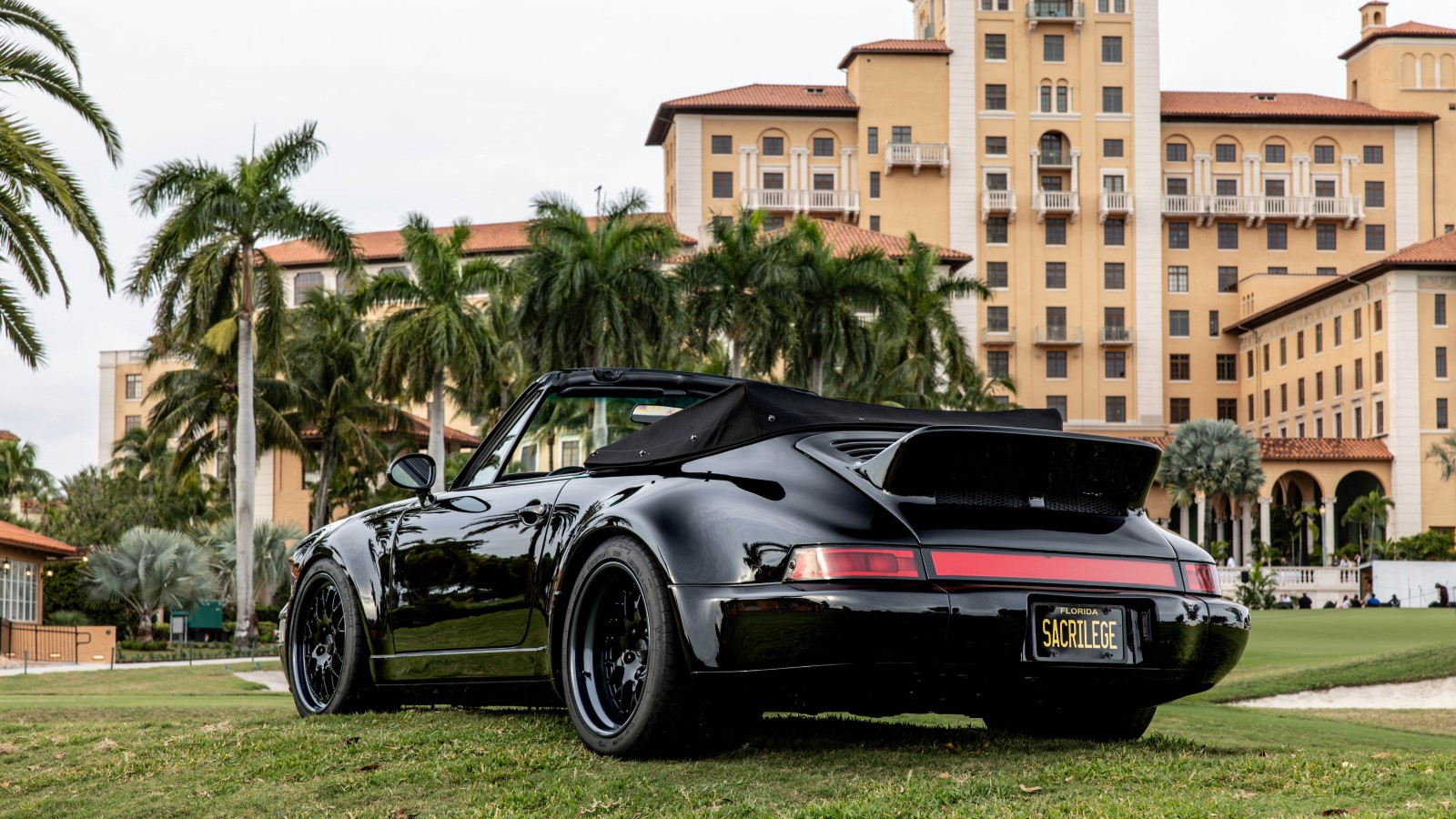
"What Bobby wanted to do was find an engineered product that was capable of creating a 964 that maintains the period specific familiarity that you'd expect, and also have instant torque and even more horsepower than you got when it was new. Basically, an unbelievable driving experience that you couldn't get back then. Now you can, in an almost maintenance-free design with that familiar driving experience you get with the 964s."
100 Percent Reversible Modifications
Setting off, it is instantly clear we are not in a golf cart, kit car, fly-by-night conversion or, in fact, anything but a 911. Indeed, the 964's electrification requires no modification to the body or suspension, beyond the use of Euro-spec RS strut mounts and custom Penske racing shocks with separate reservoirs, which Singh developed in concert with Penske Racing. With the older G-Body builds, the recipe calls for the elimination of its torsion bar suspension in favor of coil-overs and the addition of G-body-specific custom Penske shocks and reinforced shock towers. All mods, Wagenheim states, are 100 percent reversible as all of the donor car's chassis and pick up points remain unchanged.
Cars can be painted any color and interior materials are infinitely customizable to suit any new owner, yet, in this car at least, the results are perfectly tasteful. There's basket-weave leather and Italian suede ruling the day and not a spot of loathsome decorative carbon fiber to be seen. As we strap into the very black car's black seats, the top is down on a sunny afternoon and high-voltage air conditioning is quietly blowing cold air my way. Then, we set off.
The Blackbird Roadster proves to be one of the most enjoyable electric cars I have driven to date. It is, as promised, very fast, if not hysterically so, which suits me fine. Sixty comes up in 3.8 seconds, Wagenheim says, hastening to emphasize that "this isn't a track car. It's a car to just go have fun. It's a car to go on a Sunday drive with your friends." He admits to having hit 130 mph, "hypothetically, and not on American roads," he chuckles. "But 158 mph is a number I could get comfortable with."
While I likely never exceed 65 mph on the tight, winding lanes above the Hudson River, I quickly find myself smitten. The suspension is honed by Singh over thousands of laps at Lime Rock and in thousands of miles of road use, including extensive winter driving, works brilliantly. There's outstanding turn in and body control and while all electric cars benefit from the low center of gravity of their heavy battery packs, this 964 suffers none of the annoying pitching and bobbing of most other electrics I've driven.
The brakes – Brembos all around – are mighty and fade-free, while Michelin Pilot Sport 2 tires – 235/40 up front and 295/35 at the rear – adorn custom Fiske three-piece wheels. With no traction control, big tires are essential for that vintage feel, Wagenheim tells me, yet steering feel and response are everything you'd expect of a 911. Racer Steve Katz, who holds the all-time lap record at Lime Rock in a 996 Cup Car, wasn't keen on driving the Sacrilege car around the celebrated track, according to Wagenheim. "He's very anti-EV. He said, 'I don't want to, I don't like EVs.' I said, 'Do me a favor. Just drive it.' He did and he said, it's basically the best street car he's ever had on the track. It's closer to his race car than any street car he's ever driven on the track'."
Indeed, the only thing that would deter me – and just about all of the world's population, to be fair – from buying a Sacrilege conversion would be the price. $850,000 without a donor car, sourced by the company, or $750,000 when the purchaser supplies a car that is sufficiently straight and unrusted. This means it's a rarefied bunch that may be interested, some of whom will be enticed by the Blackbird, the Enigma coupe – a sunroof-delete model that's soon to debut – or perhaps one of the six other cars already being built in Sacrilege's Connecticut facility. To try and draw in those high-profile buyers, the company plans to be at Pebble Beach in August, as it was last year, where it will show off the Blackbird. Clearly it's ready to sell some cars.
Keeping Porsche On Their Side
However, there's one thing you won't find on a Sacrilege conversion: Porsche badges. Wagenheim and Singh are very aware of the increasingly heated relations between the world's leading bespoke 911 outfit, Singer, and Porsche, which has grown increasingly testy with the California-based firm. The difference, according to Wagenheim, "they're using Porsche's name all over their car. So what we did was, we went to the U.S. Patent Office and filed for a design of an emblem. And what we really wanted to do is start a conversation with Porsche, because I love Porsche. I don't want to do anything to violate Porsche. It is my dream to work with them. And they came back and had an issue with the emblem we designed. It had four quadrants [like Porsche's logo,] unlike the one we're using now, a simple shield with lines in the middle representing the engineering symbol for battery. So it's a little Easter egg. We reached out to them, as I want to do everything they request of us, as I don't want to offend. Porsche is the only car I really enjoy driving."
So problem solved? "Well," says Wagenheim, "they didn't say 'No.' But, then, they didn't say 'Yes.' What we've done is remove all [Porsche] badging from the car, except the original Porsche radio, but if they want me to take it off the radio, I'll take it off the radio. Whatever Porsche wants, we'll do and you can print that. I'm a fan, an ultimate fan. And I'm not telling anyone not to drive air-cooled cars. I'm saying you can have an alternative to your stable of air-cooled ones in these conversions."
While Sacrilege has taken every effort to eliminate all Porsche logos from the reimagined cars on the not unreasonable assumption that the legendary German carmaker might greet their fledgling enterprise with the same utter lack of humor that the long-established 911 re-imaginer Singer has faced, which strikes us as a high bar, Wagenheim is undeterred. "I'd like to sell a couple hundred cars," he says. "I want to be the Singer of EV-converted 911s."
